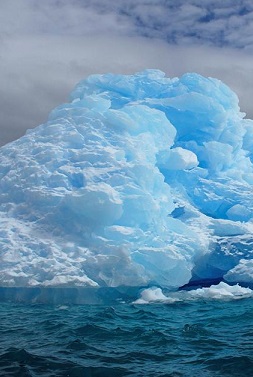Ice levels reach new low
 Antarctic sea ice has hit a record low.
Antarctic sea ice has hit a record low.
Antarctic sea ice has reached its lowest winter extent on record, according to preliminary data from the US National Snow and Ice Data Center (NSIDC).
The maximum extent, which occurred on September 10th, remained below 17 million square kilometres for the first time since satellite records began in 1979.
This new low is more than a million square kilometres below the previous record set in 2022, exceeding the size of Egypt.
The decrease in Antarctic sea ice is attributed to unseasonably warm sea-surface temperatures in the Southern Ocean and warmer atmospheric temperatures over East Antarctica, altering the large-scale atmospheric circulation over the region.
Scientists are closely monitoring whether this is part of natural variability or a concerning trend linked to increased greenhouse gases in the atmosphere and ocean.
“The 2023 Antarctic sea-ice deficit has direct impacts on the climate- and ecosystems, both nearby as well as far field, including at lower latitudes, which are home to the majority of human population and their economic interests,” said Dr Petra Heil, an expert from the Australia Antarctic Division and part of WMO's Global Cryosphere Watch.
Antarctica's ice and sea ice play a critical role in regulating the climate by reflecting the sun's energy back into space. Reduced sea ice leads to higher temperatures, creating a vicious cycle.
“There is growing concern about rapid changes in the cryosphere - melting sea ice, ice sheets and glaciers,” says Omar Baddour, chief of climate monitoring at WMO.
“The drop in Antarctic sea ice this year has been really dramatic. What happens in Antarctica and the Arctic affects the entire globe.”
Arctic sea ice has been steadily declining, with this year's summer minimum extent ranking as the eighth lowest on record.
Antarctica, once considered relatively stable, has shown a consistent low extent of sea ice since 2017.
Thomas Lavergne from the Norwegian Meteorological Institute predicts that September 2023 will likely set a record for the lowest monthly average winter ice extent in Antarctica.
Dr Gorm Dybkjær of the Danish Meteorological Institute says that the extreme rarity of this event suggests a possible shift in the physical system to a new state.
The decline in Antarctic sea ice has already had severe consequences for wildlife, including Emperor penguins.
In 2022, regions with total sea ice loss saw unprecedented breeding failure among Emperor penguin colonies, with over 90 per cent of colonies projected to be quasi-extinct by the century's end due to ongoing global warming.
The Antarctic climate experiences natural variations, influenced by high winds across its vast expanse. The Antarctic Peninsula has warmed significantly over the past 50 years, while remote East Antarctica has been less affected.
The Intergovernmental Panel on Climate Change (IPCC) highlights strong warming trends in the Antarctic Peninsula and other West Antarctic regions.
The WMO's Congress in May 2023 elevated the cryosphere as a top priority, recognising the increasing impacts of diminishing sea ice, melting glaciers, and permafrost on global sea levels, water security, economies, and ecosystems.








 Print
Print